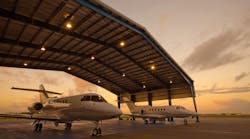A proposal to turn Hobby Airport international has struck a chord with the flying public.
An overwhelming majority of more than 150 online reader comments posted to a Houston Chronicle report detailing Southwest Airlines' idea to begin flying to Latin America out of Hobby - and United Airlines' vehement opposition to it - were either pro-Southwest, anti-United or both. Similar sentiments dominated reader emails and blog posts.
These aren't scientific surveys, but the people expressing the views are passionate.
"I'm really hoping that an increased Southwest international presence works to increase United's customer experience," Houston-based blogger Cory Crow wrote, scolding United for wanting to "limit competition."
The idea appears particularly appealing to travelers disillusioned by the United-Continental merger, including the carrier's decision to locate headquarters in Chicago rather than Houston. They also are frustrated with what they see as a general degradation in service, higher airfares and lingering hang-ups resulting from the merged carrier's transition to a single reservation system last month.
Many fliers think the increased competition from Southwest would force United to reduce fares on its many Latin America flights out of Bush Intercontinental Airport.
"When I saw that piece in the newspaper, I said, 'Yeah, that's exactly what we need - some price competition," said Art Bullard, who travels to Mexico for work and vacation several times a year.
Price of oil a factor
According to data compiled by Hotwire.com, average airfares from Houston to Cancun and other Mexican destinations have increased steadily since March 2009 and were higher across the board last month than they were in 2007 before the onset of the recession and also in 2008 when record high-oil prices jacked up all types of airfares.
High-priced oil also factors in the escalating fares now, along with an improving economy.
Average airfare from Houston to Cancun last month was $630, compared to $495 a year ago.
Many base their support for Southwest's proposal on the problems they've had since United switched to what used to be Continental's reservation system. Complaints include missing mileage on frequent flier accounts, trouble checking into flights online, long lines at check-in desks and lengthy phone wait times.
"We have flown Continental for years and never had these issues," said Marilynne Franks, who missed a United flight to Costa Rica last month at the beginning of the spring break holiday due to long lines at the baggage counter, even though she and her husband arrived two hours early.
"This only proves that we need another international option," Franks said in an email.
Not enough security?
But longtime Continental customer Patrick O'Connell, now a top-tier frequent flier under United's loyalty program, said he understands the carrier's opposition to the plan, fearing that setting up a customs facility at Hobby would take officers from Bush Intercontinental.
Citing personal experiences with long wait times returning from international trips, O'Connell said Customs staffing at Bush Intercontinental already is too low.
"It's already bad, so if it's a zero sum game with the number of Customs employees, then Houston's going to be worse off if that occurs," O'Connell said.
Two Houston-area lawmakers made the same argument in a letter to Mayor Annise Parker, who is expecting to receive a recommendation on Southwest's proposal from Houston Airport System Director Mario Diaz on April 9.
Diaz will base his recommendation on a final report the system is expected to release Monday that will summarize two commissioned studies examining the economic impact the plan would have on the city and its airports.
The City Council is scheduled to vote on the proposal in May.
Not a drastic drop?
Airfare analysts say the increased competition probably would bring fares down to some extent, but probably not as drastically as fliers are envisioning.
Rick Seaney, CEO of FareCompare.com, said Southwest probably would start out by offering sales reducing fares up to 40 percent and then "settle down" a few months later into a price range reducing fares 5 to 10 percent.
Still, he said, "when you add capacity to a route, prices are going to be lower."
But with high jet fuel prices and tougher competition from merged megacarriers like Delta and United, which are able to charge higher fares on certain routes where there is less competition, it's not as easy for Southwest to offer the startlingly low fares that made it famous as the country's pioneering domestic budget carrier.
"A lot of those things that allowed Southwest to keep the price points really low are not as easy today," Seaney said, noting that it depends on how intent Southwest is "to make a stronghold."
Likely a top priority
"My guess is since this is the first time Southwest would actually be flying international, it'd be top on their priority list," he said.
Tom Parsons, CEO of Bestfares.com, said other airlines operate on a philosophy of "How much can we possibly get from these guys and still fill up the planes?"
"If I had anyone to set my prices right now, I'd rather Southwest be the guy," Parsons said. "I think they give you the best shot. But remember, at the end of the day, they need to make a profit."
Chronicle reporter Chris Moran contributed to this report.
twitter.com/kiahcollier
Copyright 2012 The Houston Chronicle Publishing CompanyAll Rights Reserved


